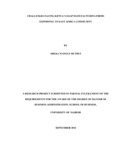| dc.description.abstract | The objective of the study was to investigate the challenges affecting Kenya‘s soaps manufacturing firms exporting to East Africa Community. The study adopted descriptive research design. The target companies were three leading soap manufacturing firms in Kenya and they included; Bidco Oil Refineries, Unilever Kenya and Ecolab East Africa (K). The study targeted 9 managers and 5 officials from the Ministry of EAC. Since the target population for this study was small and variable, the study adopted a census study approach. The study collected both primary and secondary data. The primary data was collected using a questionnaire which collected data from the management of the soap manufacturing firms while the interview schedule collected data from the officials from Ministry of East Africa Community. The study generated both qualitative and quantitative data. The quantitative data was analyzed using descriptive while the qualitative data generated from the open ended questions was reported in narrative form along with quantitative presentation. The quantitative data was analyzed using descriptive statistics. Data will be presented using tables, charts and graphs. The study found out that unfavourable legal and regulatory policies, stringent and bureaucratic documentation at border crossing, lack of harmonized requirements for operation licensing and customs, constraints with customs union and cumbersome clearance process in the border, intensive competition of soap products within the EAC market affected the soap exports from Kenyan firms. However, the companies adopted marketing strategies such as regionalization, centralization and subsidiary approach strategies which were effective. The study concludes that experienced challenges while trading their products in the EAC markets. The study concludes that Kenya soap manufacturing firms experience challenges while trading in the EAC market; they vary from legal and regulatory policies, market challenges, and logistical challenges. The study recommends that the member countries should invest in improvement of the physical infrastructure to ensure reduced logistical challenges. There is also need for harmonization of the requirements for operation licensing and customs to reduce bureaucracies and ensure effective movement of goods in the region. | en_US |



